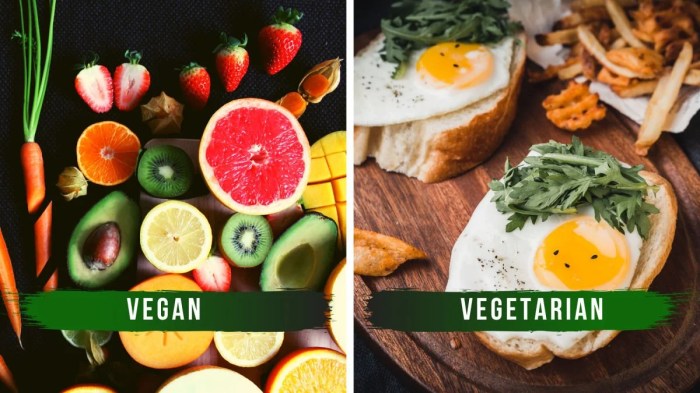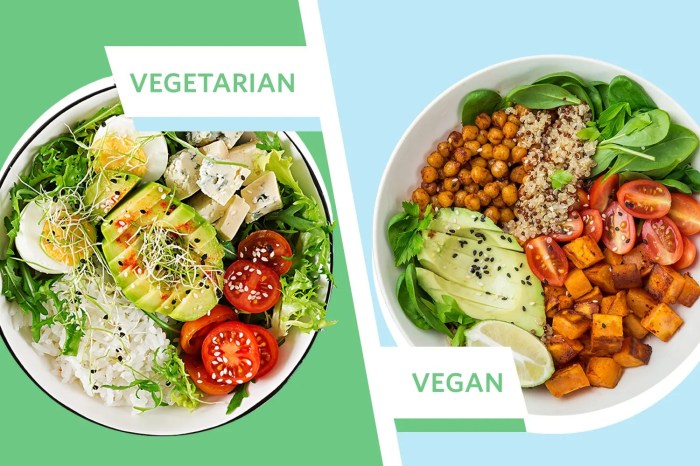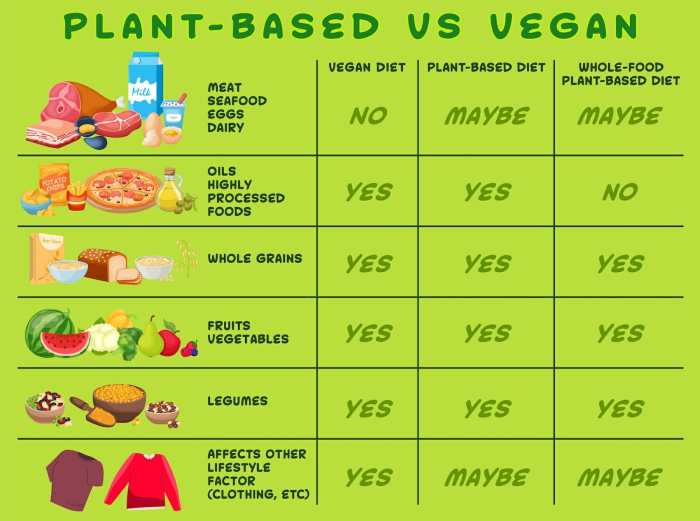In the realm of dietary choices, vegan vs vegetarian diets have emerged as polarizing topics, sparking debates about nutrition, ethics, and environmental sustainability. Delving into the nuances of each approach, this comprehensive guide unravels the distinctions between these plant-based lifestyles, empowering readers to make informed decisions that align with their values and well-being.
From the nutritional composition to the ethical implications and environmental impact, we explore the intricate tapestry of vegan and vegetarian diets, providing a balanced perspective that illuminates the complexities of this dietary divide.
Nutritional Comparison: Vegan Vs Vegetarian Diet

Vegan and vegetarian diets offer unique nutritional profiles, each with its own set of potential benefits and risks. Understanding the differences between these two diets is crucial for making informed choices about your dietary needs.
The table below compares the nutritional content of vegan and vegetarian diets, highlighting the key differences in protein, vitamins, minerals, and fiber intake.
| Nutrient | Vegan Diet | Vegetarian Diet |
|---|---|---|
| Protein | Lower intake, primarily from plant sources (beans, lentils, tofu) | Moderate intake, from both plant and animal sources (eggs, dairy) |
| Vitamin B12 | Deficient, must be supplemented | Adequate, from eggs and dairy products |
| Iron | Lower intake, but higher absorption rate | Moderate intake, but lower absorption rate |
| Calcium | Lower intake, but fortified foods and supplements available | Adequate, from dairy products |
| Fiber | Higher intake, from fruits, vegetables, and whole grains | Moderate intake, from fruits, vegetables, and whole grains |
Health Benefits and Risks
Vegan and vegetarian diets have been associated with several health benefits, including reduced risk of heart disease, stroke, and certain types of cancer. However, these diets also pose potential risks, such as nutrient deficiencies if not planned carefully.
Vegans are at a higher risk of vitamin B12, iron, and calcium deficiencies, while vegetarians may have lower intakes of iron and calcium compared to omnivores. It is essential to consult with a healthcare professional or registered dietitian to ensure that your diet meets your individual nutritional needs.
Environmental Impact
Vegan and vegetarian diets have distinct environmental implications, primarily related to food production practices. The environmental impact of food production includes greenhouse gas emissions, water usage, and land use.
In general, vegan diets are considered more environmentally sustainable than vegetarian diets. This is because vegan diets eliminate animal products, including meat, dairy, and eggs, which have a higher environmental footprint compared to plant-based foods.
Greenhouse Gas Emissions
Animal agriculture is a major contributor to greenhouse gas emissions, particularly methane and nitrous oxide. Methane is released during the digestion process of ruminant animals, such as cows and sheep, while nitrous oxide is emitted from manure management and fertilizer application.
Vegan diets eliminate these emissions by excluding animal products from the food chain. Vegetarian diets, on the other hand, still include dairy and eggs, which contribute to greenhouse gas emissions, although to a lesser extent than meat production.
Water Usage
Animal agriculture also requires significant amounts of water. The production of one pound of beef, for example, requires approximately 1,800 gallons of water. This includes water used for irrigation of feed crops, as well as water for drinking and processing.
Vegetarians abstain from consuming animal products, but what about seafood? The answer is not always straightforward. Some vegetarians choose to include seafood in their diet, while others avoid it altogether. If you’re curious about can vegetarians eat seafood , read on to learn more about the different perspectives on this topic.
Vegan diets require less water compared to vegetarian diets, as plant-based foods generally have a lower water footprint. For instance, producing one pound of tofu requires approximately 300 gallons of water, while producing one pound of cheese requires approximately 900 gallons of water.
Land Use
Animal agriculture also requires a significant amount of land. Grazing land for livestock and land for growing feed crops account for a large portion of global land use.
Vegan diets require less land compared to vegetarian diets, as plant-based foods can be grown more efficiently on less land. For example, one acre of land can produce approximately 20 times more soybeans than it can produce beef.
In conclusion, vegan diets have a lower environmental impact compared to vegetarian diets, as they eliminate the greenhouse gas emissions, water usage, and land use associated with animal agriculture.
Seafood, a staple in many diets, raises a question for vegetarians: can they partake in its consumption? Can vegetarians eat seafood ? The answer lies in the definition of vegetarianism itself. Those who adhere to this lifestyle abstain from meat, poultry, and other animal products, including fish and shellfish.
Therefore, the consumption of seafood is generally not considered vegetarian.
Ethical Considerations
Veganism and vegetarianism raise important ethical questions about the treatment of animals in food production systems. Vegans and vegetarians believe that animals deserve to be treated with respect and compassion, and they choose to abstain from consuming animal products in order to align their actions with their beliefs.
The treatment of animals in factory farms is a major concern for many vegans and vegetarians. Animals in these facilities are often subjected to overcrowding, unsanitary conditions, and painful procedures such as debeaking and tail docking. They are also given antibiotics to prevent the spread of disease and hormones to promote rapid growth.
These practices can lead to a variety of health problems for the animals, including lameness, respiratory infections, and mastitis.
Motivations and Beliefs, Vegan vs vegetarian diet
Vegans and vegetarians are motivated by a variety of ethical concerns, including:
- The belief that animals are sentient beings who deserve to be treated with respect.
- The belief that factory farming is cruel and inhumane.
- The belief that a plant-based diet is healthier for humans and the environment.
Vegans and vegetarians believe that their choices can make a difference in the lives of animals. By choosing to abstain from animal products, they are sending a message that they do not support the cruel and inhumane practices of factory farming.
Health Considerations
Vegan and vegetarian diets have been linked to various health benefits, including a reduced risk of chronic diseases, weight management, and reduced inflammation.
The following table summarizes some of the health outcomes associated with vegan and vegetarian diets:
| Health Outcome | Vegan Diet | Vegetarian Diet |
|---|---|---|
| Heart Disease | Lower risk | Lower risk |
| Cancer | Lower risk | Lower risk |
| Type 2 Diabetes | Lower risk | Lower risk |
| Weight Management | May aid in weight loss and maintenance | May aid in weight loss and maintenance |
| Inflammation | May reduce inflammation | May reduce inflammation |
Risk of Chronic Diseases
Both vegan and vegetarian diets have been associated with a lower risk of chronic diseases, such as heart disease, cancer, and type 2 diabetes. These diets are typically rich in fruits, vegetables, and whole grains, which are all high in antioxidants and fiber.
Antioxidants help to protect cells from damage, while fiber helps to lower cholesterol and blood sugar levels.
Diet and Weight Management
Vegan and vegetarian diets may also aid in weight loss and maintenance. These diets are typically lower in calories and fat than meat-based diets. Additionally, the high fiber content of these diets helps to promote satiety and reduce hunger cravings.
Diet and Inflammation
Inflammation is a major risk factor for many chronic diseases. Both vegan and vegetarian diets have been shown to reduce inflammation. These diets are typically high in anti-inflammatory foods, such as fruits, vegetables, and whole grains.
Practical Considerations

Adopting a vegan or vegetarian diet requires careful planning and consideration. Understanding the challenges and benefits of these diets can help individuals make informed decisions.
One of the main practical challenges of a plant-based diet is ensuring adequate nutrient intake. Essential nutrients such as protein, iron, calcium, and vitamin B12 are less readily available in plant-based foods compared to animal products. However, with proper planning and supplementation, it is possible to meet all nutrient requirements on a vegan or vegetarian diet.
Availability of Vegan and Vegetarian Food Options
The availability of vegan and vegetarian food options has improved significantly in recent years. Many grocery stores and restaurants now offer a wide variety of plant-based products, including meat and dairy alternatives, fruits, vegetables, legumes, and grains. Online retailers also provide a convenient way to purchase specialized vegan and vegetarian ingredients and products.
Tips for Transitioning to a Plant-Based Diet
Transitioning to a vegan or vegetarian diet can be gradual or abrupt, depending on individual preferences. Here are some tips for making the switch:
- Start by incorporating more plant-based meals into your weekly routine.
- Experiment with different recipes and cuisines to find plant-based dishes you enjoy.
- Seek support from online communities, support groups, or registered dietitians for guidance and motivation.
- Be patient and don’t get discouraged by setbacks. It takes time to adjust to a new way of eating.
Closing Summary

Whether embracing a vegan or vegetarian diet, the choice ultimately rests upon individual beliefs, preferences, and health considerations. Both approaches offer unique advantages and challenges, and it is essential to approach this decision with a nuanced understanding of the potential implications.
By delving into the complexities of these plant-based lifestyles, we empower individuals to make informed choices that align with their values, health goals, and environmental concerns.
Expert Answers
What is the primary distinction between vegan and vegetarian diets?
Vegan diets exclude all animal products, including meat, dairy, eggs, and honey, while vegetarian diets permit the consumption of dairy products, eggs, and sometimes honey.
Are vegan and vegetarian diets nutritionally adequate?
Both diets can provide all essential nutrients with careful planning. Vegans must pay particular attention to vitamin B12, iron, and calcium intake, while vegetarians should ensure adequate protein and iron consumption.
What are the ethical considerations associated with veganism and vegetarianism?
Vegans and vegetarians share concerns about animal welfare and the treatment of animals in food production systems. Vegans extend this concern to all animal products, while vegetarians focus primarily on the ethical implications of meat consumption.